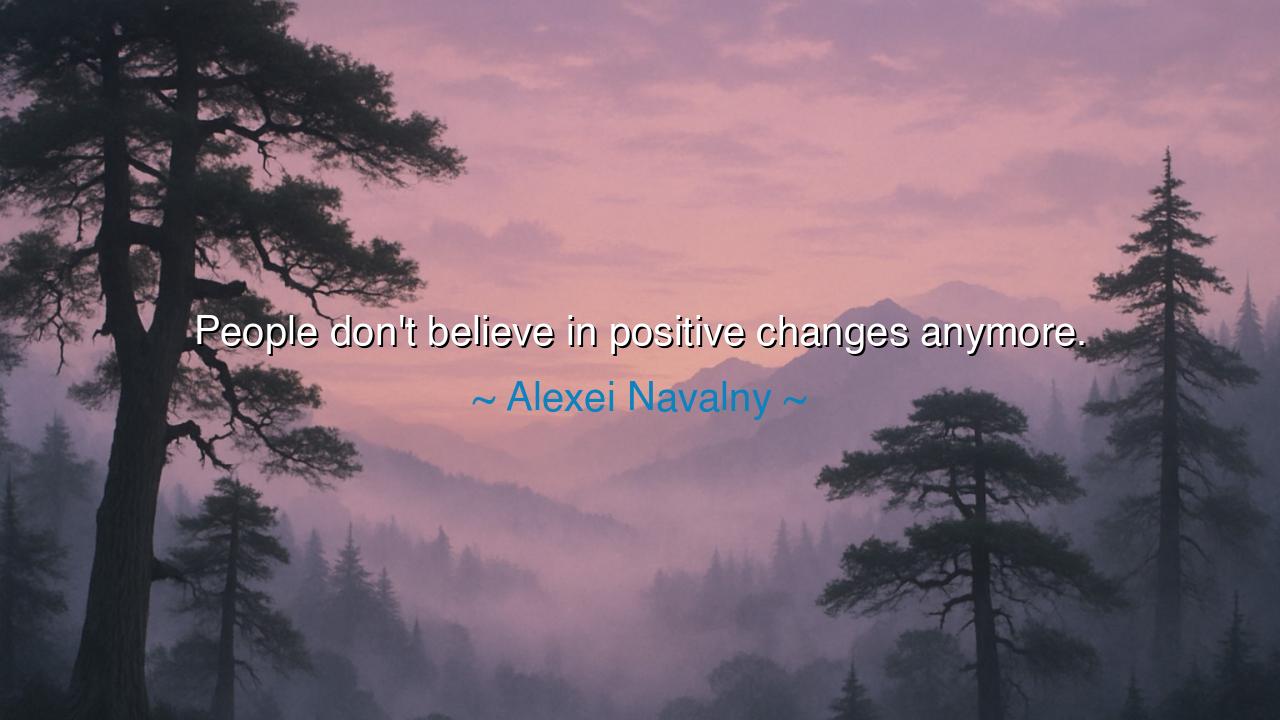
People don't believe in positive changes anymore.






Hear the solemn cry of Alexei Navalny, who once declared: “People don't believe in positive changes anymore.” These words are not the sigh of a weary man, but the echo of a people disillusioned by broken promises, by cycles of corruption, by the heavy hand of despair. They speak of a wound deep in the heart of society: when hope fades, when faith in transformation is lost, the soul of a nation begins to wither. To believe in positive change is to believe that tomorrow can be brighter than today. To lose that belief is to surrender to chains without even the will to resist them.
The meaning of this quote lies in the power of belief itself. Every great transformation in history began not with armies or wealth, but with people daring to imagine that life could be better. When people stop believing in change, they stop striving, and when they stop striving, tyranny flourishes unchallenged. Navalny, a man who stood against corruption, uttered these words as both warning and lament: the greatest victory of oppression is not the silencing of voices, but the extinguishing of hope.
History offers a clear mirror. Consider the long years before the fall of the Berlin Wall. For decades, many who lived under the iron grip of division and surveillance felt that change was impossible, that the wall would stand forever. Yet whispers of belief remained alive—in churches, in student groups, in secret conversations. Those small embers of faith, when fanned, became the fire of revolution. The wall that seemed eternal crumbled in a single night, proving Navalny’s warning and its antidote: when belief in positive changes returns, the impossible becomes reality.
Navalny’s words also reveal the cunning strategy of oppression. Corrupt systems do not merely exploit; they seek to convince people that resistance is useless. They allow just enough survival to keep the body alive, while starving the soul of hope. In such a world, even the dream of change is mocked as childish. But as the ancients taught, it is not the sword that most enslaves—it is the chain upon the mind. Break the chain of disbelief, and the chains upon the body begin to fall away.
The deeper wisdom here is this: hope is a discipline. Believing in positive change is not always easy, especially in times of darkness. It requires courage to imagine a better world when all evidence seems to deny it. Yet those who believe against the odds become the seed of transformation. Gandhi, imprisoned and scorned, believed. Mandela, confined for twenty-seven years, believed. Their belief was not naïve—it was the foundation upon which liberation was built. Navalny’s lament calls us to this same discipline of hope.
The lesson for us is clear: do not surrender your faith in positive change. Guard it as you would a flame in the wind. Feed it daily with small acts—of kindness, of justice, of truth-telling. Speak of change even when others scoff. Work for it even when progress is slow. For belief, once shared, multiplies; it spreads like fire across dry grass, igniting courage in others. The greatest revolutions of history began with a handful who refused to let disbelief win.
So I say unto you: hear Navalny’s warning, but let it not be the end of the story. Refuse the poison of despair. Believe, act, and speak as though positive change is possible—for in that belief lies the very power to make it real. And when generations yet unborn look back, let them say: these were the ones who did not surrender to despair, these were the ones who believed, and by believing, built a new world.






QNNguyen Quynh Nhu
When Alexei Navalny says people no longer believe in positive changes, I think about how easily people can become disillusioned by politics, media, or even personal experiences. Has the constant barrage of bad news created an environment where hope feels unattainable? But does this mean change isn’t possible, or does it just require more patience and persistence? What needs to happen for society to regain trust in the potential for meaningful transformation?
TAThuc Anh
Navalny’s quote resonates with a lot of people who feel like the world isn’t getting better. We see this in the rise of pessimism, especially on social media where negativity often dominates. But if people don’t believe in positive change anymore, does this mean we should stop striving for it altogether? What would happen if we all gave up on the idea of change? How can we change the narrative to inspire belief in positive outcomes again?
NTmai nhat thanh
It’s concerning that Alexei Navalny feels people no longer believe in positive changes. Has the continuous cycle of disappointments and setbacks in politics or social movements led to this loss of faith? It would be interesting to know what factors have contributed to this shift in perspective. Is it due to corruption, mismanagement, or the overwhelming complexity of global issues? Can we restore hope in the power of change, or is it too late for some?
VHDang viet Hung
I understand the frustration behind Navalny's quote. It seems that many people have grown disillusioned by the slow pace of societal, political, or even personal change. But could this statement be a sign of something deeper, like a loss of hope or a disconnect from real progress? Is it possible that positive change has simply become harder to recognize amidst global challenges? How do we redefine what 'positive change' even looks like in today’s world?
HNhiep nguyen
Navalny’s statement suggests that people have become jaded and no longer believe in the potential for positive changes. This makes me wonder if our societal focus on short-term results and immediate gratification has eroded our belief in long-term progress. Can positive change still happen in the world, or are we too caught up in negativity to see it? How do we reignite that belief in change without being overly idealistic?